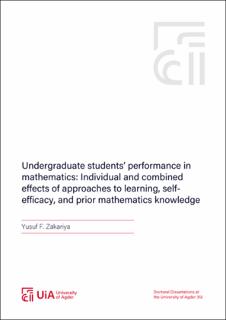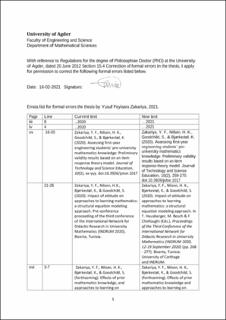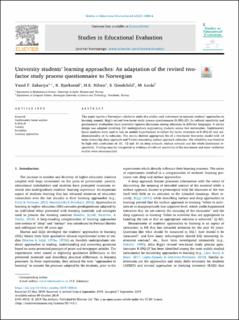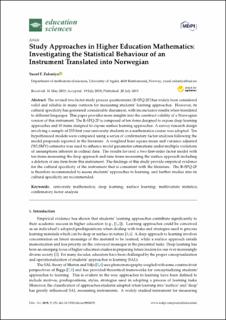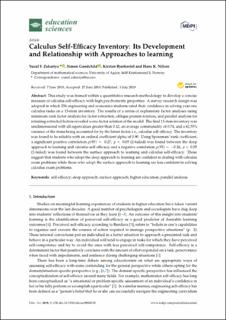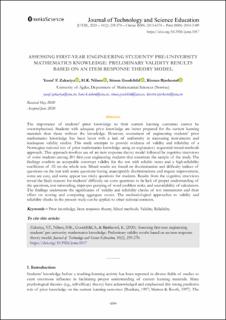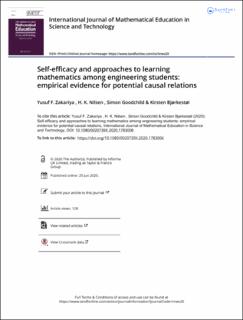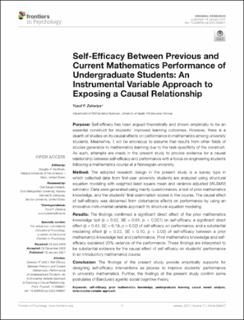| dc.contributor.author | Zakariya, Yusuf F. | |
| dc.date.accessioned | 2021-04-15T08:41:06Z | |
| dc.date.available | 2021-04-15T08:41:06Z | |
| dc.date.created | 2021-04-14T11:09:17Z | |
| dc.date.issued | 2021 | |
| dc.identifier.citation | Zakariya, Y. F. (2021). Undergraduate students’ performance in mathematics : Individual and combined effects of approaches to learning, self-efficacy, and prior mathematics knowledge [PhD. thesis]. University of Agder. | en_US |
| dc.identifier.isbn | 978-82-8427-016-6 | |
| dc.identifier.issn | 1504-9272 | |
| dc.identifier.uri | https://hdl.handle.net/11250/2737867 | |
| dc.description | Paper VII is not published yet. | en_US |
| dc.description.abstract | This dissertation concerns an exploration of factors that affect the learning outcomes of students in higher education mathematics. It is framed within a quantitative research paradigm in which the existence of personal factors such as prior knowledge, self-efficacy, and approaches to learning are assumed and that these factors may be operationalised and measured. The aim of this study is to investigate effects of prior mathematics knowledge, approaches to learning and self-efficacy on students’ performance in a first-year introductory calculus course for students on engineering programmes. Further, the interrelatedness of these factors and their combined effects on performance are also investigated. Two well-established psychological theories are combined to form the conceptual framework for justifying appropriateness and usefulness of chosen constructs under investigation coupled with hypothesised relationships among the constructs. These theories are student approaches to learning theory and self-efficacy theory. A cross-sectional survey research design was adopted with a focus on engineering students aimed at addressing three research questions. These research questions are formulated as follow:
1. Do approaches to learning mathematics differ with respect to the prevalence of deep and surface approaches among first-year engineering students?
2. Does self-efficacy influence adoption of either deep or surface approach to learning mathematics among first-year engineering students?
3. What are direct and indirect effects of prior mathematics knowledge, approaches to learning, and self-efficacy on performance in mathematics among first-year engineering students?
The data used for the present study were collected in two phases (pilot study and main study) using questionnaires, a pre-test of students’ basic mathematical knowledge and final examination scores in an introductory calculus course. The pilot study data were collected in Spring 2019 and used to develop and validate the questionnaires. The main study data were collected in Autumn 2019 and used to investigate hypothesised structural relationships between prior mathematics knowledge, approaches to learning, self-efficacy, and students’ performance in the course. Eight research hypotheses were formulated and tested using structural equation modelling techniques. The resulting findings were well-documented and published in seven peer-reviewed journal papers and one peer-reviewed conference paper. | en_US |
| dc.language.iso | eng | en_US |
| dc.publisher | University of Agder | en_US |
| dc.relation.ispartofseries | Doctoral Dissertations at the University of Agder; no. 312 | |
| dc.relation.haspart | Paper I: Zakariya, Y. F., Bjørkestøl, K., Nilsen, H. K., Goodchild, S. & Lorås, M. (2019). University students’ learning approaches: an adaptation of the revised two-factor study process questionnaire to Norwegian. Studies in Education Evaluation, 64: 100816. https://doi.org/10.1016/j.stueduc.2019.100816. Published version. Full-text is available in AURA as a separate file: https://hdl.handle.net/11250/2648148. | en_US |
| dc.relation.haspart | Paper II: Zakariya, Y. F. (2019). Study approaches in higher education mathematics : Investigating the statistical behaviour of an instrument translated into Norwegian. Education Sciences, 9(3): 191. https://doi.org/10.3390/educsci9030191. Published version. Full-text is available in AURA as a separate file: http://hdl.handle.net/11250/2607171. | en_US |
| dc.relation.haspart | Paper III: Zakariya, Y. F., Goodchild, S., Bjørkestøl, K. & Nilsen, H. K. (2019). Calculus self-efficacy inventory : Its development and relationship with approaches to learning. Education Sciences, 9(3): 170. https://doi.org/10.3390/educsci9030170. Published version. Full-text is available in AURA as a separate file: http://hdl.handle.net/11250/2604019. | en_US |
| dc.relation.haspart | Paper IV: Zakariya, Y. F., Nilsen, H. K., Goodchild, S. & Bjørkestøl, K. (2020). Assessing first-year engineering students’ pre-university mathematics knowledge : Preliminary validity results based on an item response theory model. Journal of Technology and Science Education, 10(2), 259-270. http://dx.doi.org/10.3926/jotse.1017. Published version. Full-text is available in AURA as a separate file: https://hdl.handle.net/11250/2676319. | en_US |
| dc.relation.haspart | Paper V: Zakariya, Y. F., Nilsen, H. K., Bjørkestøl, K. & Goodchild, S. (2020). Impact of attitude on approaches to learning mathematics : a structural equation modeling approach. In T. Hausberger, M. Bosch & F. Chelloughi (Eds.), Proceedings of the Third Conference of the International Network for Didactic Research in University Mathematics (p. 268 - 277). University of Carthage and INDRUM. https://hal.archives-ouvertes.fr/hal-03113844. Published version. Full-text is not available in AURA as a separate file. | en_US |
| dc.relation.haspart | Paper VI: Zakariya, Y. F., Nilsen, H. K., Goodchild, S. & Bjørkestøl, K. (2020). Self-efficacy and approaches to learning mathematics among engineering students : empirical evidence for potential causal relations. International Journal of Mathematical Education in Science and Technology. https://doi.org/10.1080/0020739X.2020.1783006. Published version. Full-text is available in AURA as a separate file: https://hdl.handle.net/11250/2659613. | en_US |
| dc.relation.haspart | Paper VII: Zakariya, Y. F., Nilsen, H. K., Bjørkestøl, K., & Goodchild, S. (Forthcoming). Effects of prior mathematics knowledge and approaches to learning on performance in mathematics among first-year engineering students. European Journal of Education. Submitted version. Full-text is not available in AURA as a separate file. | en_US |
| dc.relation.haspart | Paper VIII: Zakariya, Y. F. (2021). Self-Efficacy Between Previous and Current Mathematics Performance of Undergraduate Students : An Instrumental Variable Approach to Exposing a Causal Relationship. Frontiers in Psychology, 11: 556607. https://doi.org/10.3389/fpsyg.2020.556607. Published version. Full-text is available in AURA as a separate file: https://hdl.handle.net/11250/2737871. | en_US |
| dc.title | Undergraduate students’ performance in mathematics : Individual and combined effects of approaches to learning, self-efficacy, and prior mathematics knowledge | en_US |
| dc.type | Doctoral thesis | en_US |
| dc.description.version | publishedVersion | en_US |
| dc.rights.holder | © 2021 Yusuf F. Zakariya | en_US |
| dc.subject.nsi | VDP::Matematikk og Naturvitenskap: 400::Matematikk: 410 | en_US |
| dc.source.pagenumber | 232 | en_US |
| dc.source.issue | 312 | en_US |
| dc.identifier.cristin | 1903963 | |
